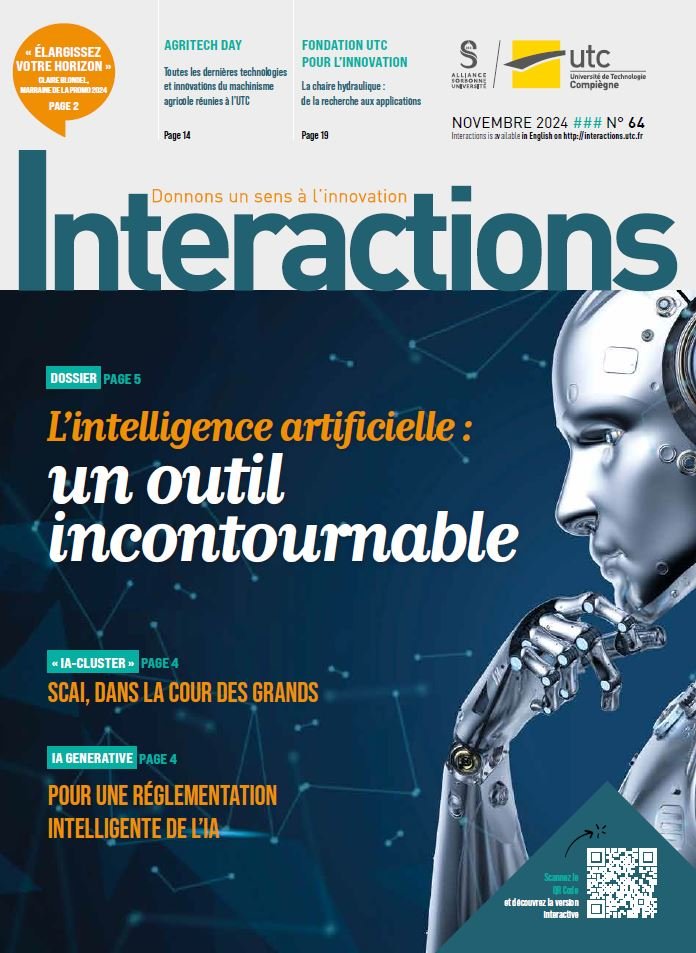Summer and Winter schools, vectors of French attractiveness

Instituted before the health crisis disrupted their organization, UTC’s Summer and Winter schools offered in Compiègne or abroad within the framework of university partnerships, have been relaunched in 2023, starting in July 2023, with the Virtual Reality for Digital Art Creation summer school, followed by the Winter School Food Engineering Science, an international school in food engineering and nutrition funded by the Sorbonne University Alliance to study food science and food formulation linked to better nutrition, eight schools have since attracted 115 students. Here’s an update from Joanna Daaboul, the university’s Director for International Relations.
What proves so attractive about the Summer and Winter schools?
They enable us to establish and nourish the link between our research and our teaching, to create collaborations and to showcase our technological platforms, among UTC’s strong points. It also helps us to stand out from the crowd when it comes to research. Some countries and universities do not offer outgoing international mobility for a full semester of study and this can be complicated for students. Summer or Winter schools offer them a short-form of mobility. They offer both an educational and a cultural experience. The exchange of students, despite the differences in mobility format (short or long) between universities, helps to balance flows, create links with partner universities, highlighting the attractiveness of France, promoting UTC and French culture. It’s an enriching, virtuous circle.
What feedback do you get from these schools?
The students think the underling projects are great. At the end of each school, we do a satisfaction survey and every time we get very positive and encouraging feedback. The Virtual Reality for Digital Art Creation, set up by Indira Thouvenin, which took place in 2023 and again in 2024, welcomed thirteen students from Tatung University in Taiwan in 2023. The students appreciated both the teaching approach, which mixes lectures with practical work and the cultural visits to Compiègne, Pierrefonds and Paris. Thanks to this school, we were able to obtain free outgoing mobility places for our students.
Summer and Winter schools formalize links with the Sorbonne. For example, the international school in Food Engineering and Nutrition proposed by Claire Rossi, UTC’s President and Director, university professor and head of the Food Science technology platform, is a collaboration with Sorbonne University as part of the Sorbonne University Alliance. The school studies nutritional aspects and strategies for replacing fats and sugars with optimized formulations providing fibre, protein, etc., with the aim of improving overall nutrition. Twelve students, two of them international, took part. For the 2025 edition, we invited our partners from the Sunrise European alliance. This school, for example, highlights not only our research and teaching innovation, but also our strong links with Sorbonne University and our partners in the Sunrise Alliance.
These schools also represent a lever for strengthening our strategic international partnerships. For example, Cécile Legallais of UTC’s BMBI ‑biomechanical and bioengineering) laboratory, in collaboration with Éric Leclerc and in partnership with the Oncolille Institute and the University of Tokyo, is organizing the SMMIL‑E Winter School for novices in biomicroengineering, to cover the main concepts related to bio- and microtechnologies and organs-on-chips systems. This generates activity, collaborations and opportunities to develop our collaborations. They create new opportunities and raise the profile of our academic research. This was also the case for the Leego school launched by professor Fahmi Bedoui, in charge of the chair in nanostructured materials [chalLEnges and opportunities in connecting lenGth and time scales in nanO-structured materials] and UCB at Berkeley (Ca).
What do they involve?
The Summer and Winter schools focus on a training theme or project, or offer intensive French language courses lasting from one to four weeks. The subjects are approved by UTC, like any other course and operate according to the same rules as other courses. They earn ECTS credits and include theoretical courses, practical work, experiments and assessments. Cultural visits, discovery days in our region and gastronomic outings in Paris enrich the training. Some are open to everyone, while others are dedicated to a specific partner.
How is all this organized and managed?
The International Relations Department or the teaching and research staff submit projects to finance these schools. This may be in a partnership with the Sorbonne University Alliance. Some are financed by student fees, but this is not the dominant practice. The Department for International Relations or the laboratory manages accommodation, food, logistics… It’s reassuring for the student. We work in collaboration with the Crous, a key UTC partner. Teaching costs are often financed by UTC or by project. Students only have to pay for transport between their home country and France. International coordinators act as a link to formalize projects, make contacts, create partnerships… We work with lecturer-cum-research scientists who suggest subjects for study. I think that if I had to sum up how it’s set up, I’d say that it’s a strong collaboration between the Department for International Relations, the Training and Pedagogy Department, the lecturer-cum-research scientists and various UTC departments.
IL




